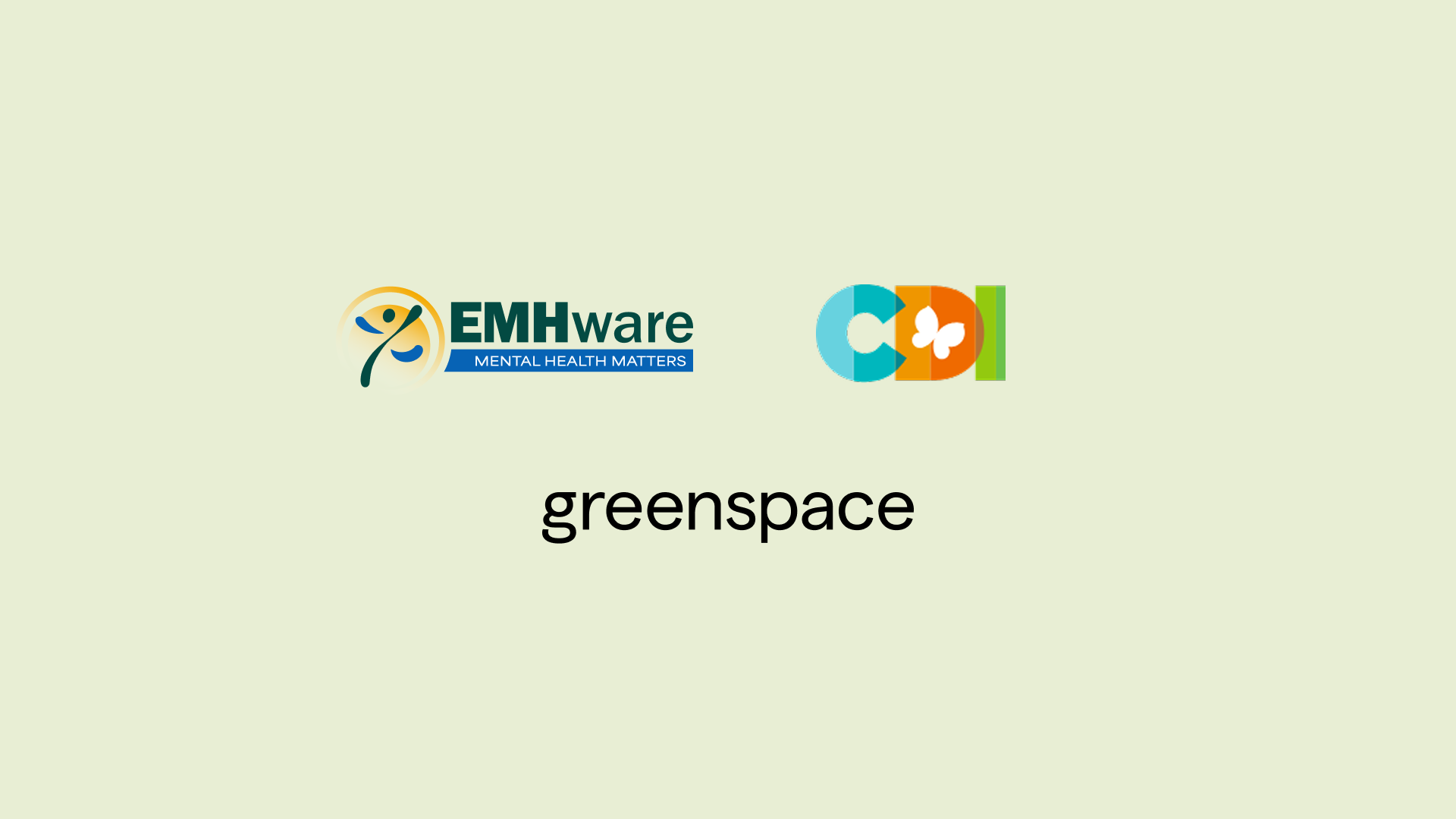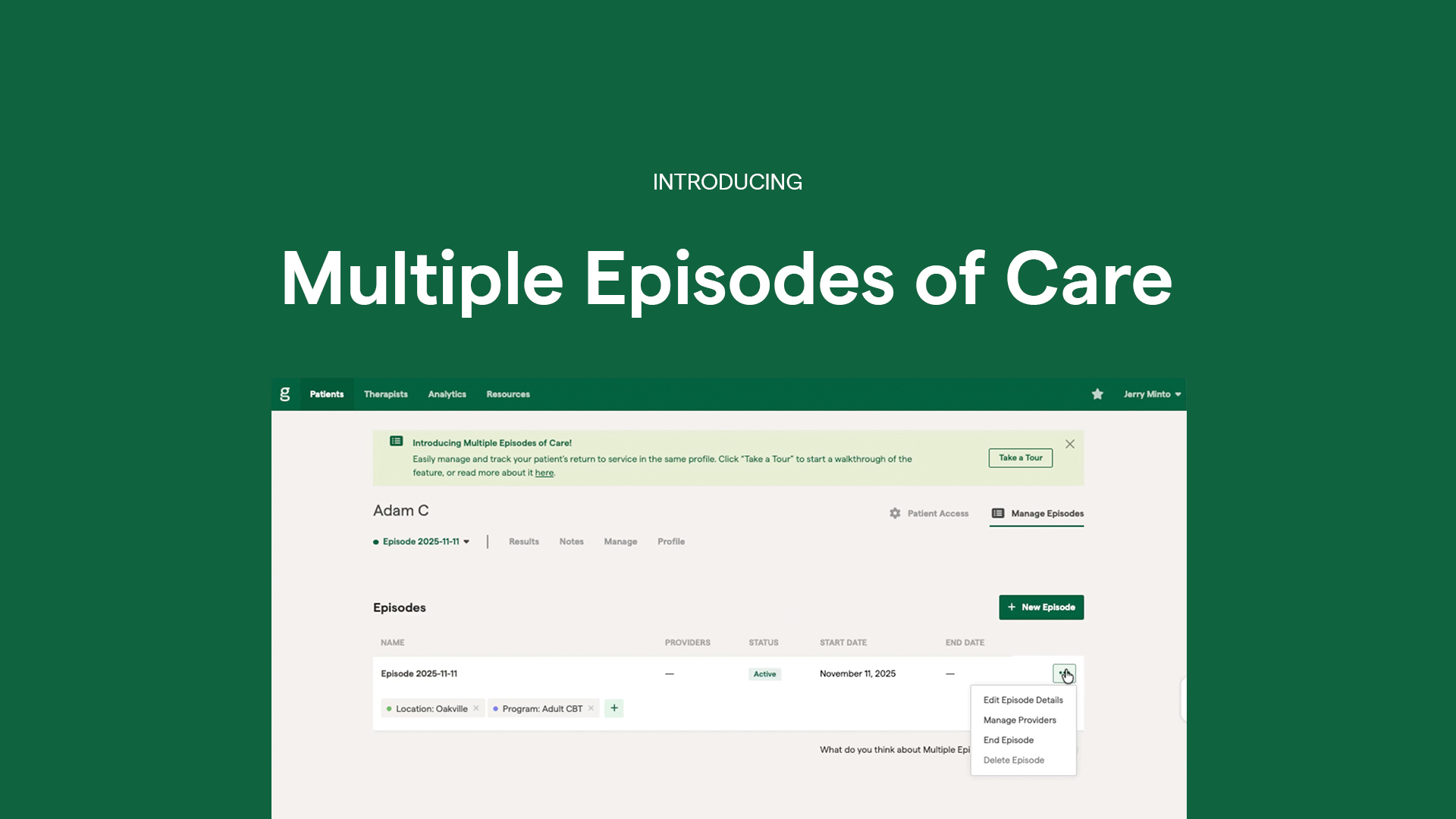
Our work with Measurement-Based Care (MBC) has drastically evolved since Greenspace was first founded. Everyday we work to innovate our technology and approach to measurement in order to make implementation easy in all settings and deliver a platform that flexes to any unique workflow across the spectrum of behavioral health services. While we always have and will support small and medium clinics, hospitals, and schools looking to implement MBC, we’re increasingly building meaningful partnerships with health systems, district school boards, and statewide networks of behavioral health organizations, who are eager to implement MBC at a large scale.
When applied across a large health system, the benefits of MBC multiply; the number of people who experience improved mental health outcomes increases, the cost savings and ROI are significant, and the sheer quantity of data collected empowers systems to continually learn from their objective outcomes and improve the quality of services they offer in a way they have not been able to before.
With the growing proliferation of large-scale MBC, we wanted to outline the various ways that implementations of this kind are meaningfully transforming systems. To help us do so, we’re infusing expertise and insights from our educational partner and world-renown applied psychologist, Dr. David Clark.
Dr. Clark is an Emeritus Professor of Experimental Psychology at the University of Oxford and his qualifications include co-authoring the foundational MBC reading, Thrive: The Power of Evidence-Based Psychological Therapies, a book that explores the importance of MBC and the impact that evidence-based psychological therapies have on the mental wellness and costs of care of a population across large health systems. Alongside Economist Richard Layard, Dr. Clark outlined the standard for applying MBC across full health systems and eventually led the development of the NHS Talking Therapies (formerly IAPT) program, which revolutionized mental health care delivery and outcomes for individuals across the UK. In his current role of Clinical and Informatics Advisor for NHS Talking Therapies, he is deeply involved with the continuous data-informed innovation and improvements implemented across the UK’s behavioral services.
With that, here are seven key insights on the impact of MBC that every system leader should know.
1. Pre and post measurement is not the same as Measurement-Based Care
Most health systems are already engaging in basic measurement exercises; they will record certain metrics like hospital visits, wait times, and the number of people accessing services overall. In some cases, a patient’s symptom severity will be measured at the start and end of treatment—an exercise known as pre and post measurement. The gaps within this method are numerous, including the fact that pre/post measures offer little to no real clinical value; They provide no insight into how or why symptoms might be fluctuating throughout treatment, no clinically relevant data to inform care decisions throughout treatment, and no data or insights that can inform strategic improvement across programs, treatment types, or populations.
The shift from pre/post and basic service utilization metrics to a more in-depth model that leverages MBC was a major contributor to the sweeping success of the NHS Talking Therapies program. Dr. David Clark shares how low completion rates on pre/post assessments resulted in their services only having data on about 40% of people in treatment. They later learned that this lack of complete data was leading to an inaccurate representation of how effective their services were and also holding them back from the insights needed to engage in meaningful program innovations across the UK.
As our health systems experience a continued strain on resources, it’s vital that we identify ways to deliver effective and efficient care that can help our populations to thrive. MBC is the key to ensuring that everyone who accesses services receives the high quality care they need, and that no one falls through the cracks of our systems.
2. The more outcome data you collect, the more you can learn, the more care quality improves.
By implementing MBC at a large-scale system-level, there is ample opportunity to learn and improve overtime. Systems are in a perfect position to collect massive amounts of recovery and outcome data from clients across a variety of programs and services. This presents a unique opportunity to learn which populations are underserved, what combinations of presenting symptoms might indicate a non-response to treatment, what additional supports may be most impactful for specific segments of your population or specific behavioral health challenges, and many other unique learnings and insights that can be applied across programs, populations, and systems to improve outcomes and lower healthcare costs.
Within the NHS Talking Therapies program, they regularly assess which individuals are off-track or not responding to care and work to what service improvements or additional supports are needed to improve their outcomes. This process has allowed them to raise average recovery rates from 38% in 2008 to 52% in 2018— with more improvements being implemented and iterated every year. The learning is widespread, consistent, and ongoing. Most importantly, the learnings are widely shared and applied nationwide across services.
NHS Talking Therapies developed a publicly available data dashboard to make the results of the program transparent to the population and decision makers. This data has helped inform and drastically improve their services and has set a standard for other health systems across the world to learn from and replicate.
“If we hadn’t been collecting outcome data on everyone in our services, we’d still be in that position [low recovery rates] and blissfully ignorant.”
– Dr. David Clark
3. Measurement-Based Care helps drive government advocacy and funding opportunities.
An added benefit to infusing MBC into large-scale health systems is the ability to clearly demonstrate the impact behavioral health services have over time on both care quality and cost. Data is embedded in the process, which is fundamental to understanding and outlining the value of any service or new healthcare innovation—particularly when there is a need for additional or sustained government funding.
The NHS Talking Therapies program data collected through MBC clearly shows the undeniable impact of the program and its continued improvement year over year. This has led to the program receiving an increase in funding from every government administration since 2008, because as Dr. Clark puts it, “objective data is non-partisan.” The data collected through MBC is vital to the continued innovation of behavioral health services and empowers both systems and large organizations to advocate for and access the funding required to consistently improve. Not only can you demonstrate the impact of new initiatives and programming on care effectiveness and costs, you have the evidence needed to lobby government, persuade funders, and negotiate with insurers to continue investing in evidence-based services that we know truly work.
4. Establish the value of MBC from bottom up and support clinicians along the way
Dr. Clark shares his perspective on a common misconception that clients may not engage in MBC. The reality, however, is that when people in care understand the value of MBC and are given access to their results, they experience its impact and assessment completion rates are high. Across Greenspace implementations, we see an average assessment completion rate of 83%. When MBC is introduced to clients in a way that highlights the value and impact it has on treatment, they will engage and experience improvement throughout care.
A key factor that influences client participation and the value derived from MBC is assessment results being used throughout care to inform treatment discussions and decisions (within Greenspace’s Four C’s, we call this ‘Collaboration’). When MBC outcome data is leveraged throughout care, clients report feeling empowered by their results to further engage in care and actively participate in their sessions. Additionally, it provides them with a stronger understanding of their mental health, and allows them to understand their progress and the impact that treatment is having on their wellbeing. From a data perspective, the research shows that when MBC is used throughout care, there’s a 40% higher overall improvement in clinical symptoms, a 3.5 times higher likelihood that clients experience reliable change, and a 40% reduction in no-show and cancellation rates.
Dr. Clark shares that, from his experience, it’s clinicians that need to be deeply engaged with MBC and understand the value of integrating it into their practice. In order to ensure clinicians establish a positive relationship with MBC and can pass their curiosity onto their clients, it’s important that they have access to training, tools, resources, and support from leadership.
Creating a culture of learning, discovery, and curiosity is key to overcoming any challenges that might arise during implementation, celebrating the wins along the way, collaborating on challenging cases, and finding ways to innovate across the system so everyone improves together.
5. There’s a clear economic case for MBC
MBC offers real financial value to the systems and organizations that implement it in a few key ways. The first factor is due to the relationship between mental health and physical health. Extensive research shows that when treated for anxiety and depression, individuals suffering from long term physical health problems have a significant reduction in outpatient and inpatient hospital admission for physical health issues. Secondly, those who receive these treatments are far more likely to return to work sooner or find secure employment sooner than those who do not. Those who have received treatment also remain employed longer, see a reduction in absenteeism and reliance on welfare benefits, and improve their overall productivity.
This evidence was part of the case made for the NHS Talking Therapies and was further validated when the program linked their data with public health data. In doing so, they found that those accessing NHS services for mental health support were less likely to be admitted for physical health issues and more likely to hold gainful employment. Importantly, the actual cost of the NHS intervention was significantly less than the cost savings associated with improved mental health of the population—with the final calculation being that for every £1 invested in the program, there is a return of £4 in terms of reduced healthcare costs, reduced work-related benefits, and increased tax revenues.
6. MBC is the Driver of Value-Based Care
The momentum behind value-based contracts continues to grow and is replacing or augmenting traditional fee-for-service contracts. The foundational component of any value-based care (VBC) model is the ability to demonstrate ‘value’. Despite a lack of clarity exactly what requirements will be for VBC contracts within behavioral health, along with varying requirements from state to state; we know that MBC is the best way for organizations to meet any VBC requirements, be able to show value, and future proof themselves to easily adapt to any new reporting requirements. While MBC is not currently billable within traditional behavioral health services, many experts in the industry expect that to change sooner rather than later. However, this doesn’t mean organizations should wait. In fact, the time to get started with MBC is now, while value-based care is in its infancy in behavioral health and there is still debate as to how it should operate.
Prioritizing MBC now allows you to be involved in and influence early stage discussions surrounding meaningful reporting requirements, demonstrate increasingly positive clinical outcomes in any negotiations and be prepared to quickly pivot and adapt as VBC continues to evolve. New contracts and shifting reimbursement structures can be intimidating, but with a rich data set that clearly demonstrates the value your services are providing and a system that allows you to easily flex and adapt, you’ll be in a prime position to get the most out of VBC.
7. The role of technology, automation, & integration
When implementing any large-scale change, technology and automation should be at the foundation. Especially in a clinical setting, MBC must not be a burden for staff or clinicians, but rather it should offer insight that facilitates their daily work and eliminates any existing administrative burden from measurement requirements. Dr. Clark drove home this point by sharing how the NHS Talking Therapies approaches data collection in order to prevent any additional work or data entry for clinicians.
Especially when approaching any large or complex implementation, leveraging an effective technology platform that can integrate with existing systems and offers a suite of automations to enable a seamless workflow is vital to widespread adoption. Features and functionality that enable the process should be embedded—like the automatic scheduling and delivery of assessments via email or SMS, immediate data transfer to IT systems and EHR’s, clear visualizations of results available to clinicians, clinical leaders and clients, along with a user-friendly interface.
At its core, MBC is meant to empower clients, providers, organizations, and systems with rich data and insights into symptoms, which are leveraged to substantially enhance care quality. Large-scale implementations require the right technology to ensure all parties involved have the tools for success and can collaborate with each other easily to share data, insights, and learnings that can improve client outcomes across the board.
MBC is the key to revolutionizing behavioral healthcare systems and improving outcomes for all individuals. We’re proud to be working with health systems and large organizations across North America to implement MBC and raise the standard for care. Thanks to MBC, not only is the quality of care across North America being raised to a higher standard, but we can see and share the impact that is clearly reflected in the outcome data. To learn more about the value of MBC for large organizations or health systems, please reach out anytime at info@greenspacehealth.com or schedule a call through our website to talk to one of our implementation experts.
To learn more about large organization and system-level MBC implementations from Dr. David Clark and other behavioral health innovators, don’t forget to register for our upcoming panel: Transforming Behavioral Health Systems through Measurement-Based Care, taking place on April 25th at 1 PM EDT/10 AM PDT.












